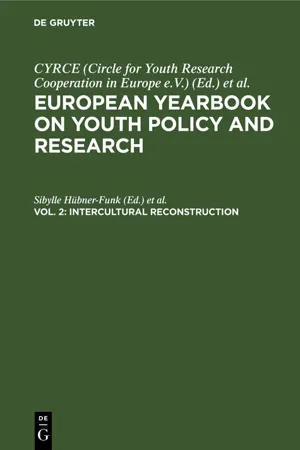
eBook - PDF
Intercultural Reconstruction
Trends and Challenges
This is a test
- 375 pages
- English
- PDF
- Available on iOS & Android
eBook - PDF
Intercultural Reconstruction
Trends and Challenges
Book details
Table of contents
Citations
Frequently asked questions
At the moment all of our mobile-responsive ePub books are available to download via the app. Most of our PDFs are also available to download and we're working on making the final remaining ones downloadable now. Learn more here.
Both plans give you full access to the library and all of Perlego’s features. The only differences are the price and subscription period: With the annual plan you’ll save around 30% compared to 12 months on the monthly plan.
We are an online textbook subscription service, where you can get access to an entire online library for less than the price of a single book per month. With over 1 million books across 1000+ topics, we’ve got you covered! Learn more here.
Look out for the read-aloud symbol on your next book to see if you can listen to it. The read-aloud tool reads text aloud for you, highlighting the text as it is being read. You can pause it, speed it up and slow it down. Learn more here.
Yes, you can access Intercultural Reconstruction by Sibylle Hübner-Funk, Lynne Chisholm, Manuela DuBois-Reymond, Burkart Sellin in PDF and/or ePUB format, as well as other popular books in Pedagogía & Educación general. We have over one million books available in our catalogue for you to explore.
Information
Table of contents
- Contents
- Editorial
- Section 1 - European Studies
- 1.1 Youth and Europe: Trends and Challenges
- 1.2 Youth in Four Post-communist Countries: Political Values and Nationalist Traditions
- 1.3 A Cross-cultural Comparison of Students' Concepts of Europe
- 1.4 Voting Behaviour of Austrian Youth as Newcomers to the European Union
- 1.5 New Trajectories of Young Adults in Europe. A Research Outline
- 1.6 Designing a European Project on Adolescent Masculinities
- 1.7 Attitudes of Dutch Young People towards Germany and the Germans
- 1.8 Xenophobia among Young Germans in the Nineties
- 1.9 Young Germans as Europeans: their Attitudes towards Europe
- Section 2 - European Youth (Research) Policies
- 2.1 News from the Youth Directorate of the Council of Europe, Strasbourg
- 2.2 News from the European Centre for the Development of Vocational Training (CEDEFOP), Thessaloniki
- 2.3 News from the European Parliament, Brussels. VIP Interview with Luciana Castellina, President of the EP's Committee on Culture, Youth, Sports and Media
- 2.4 Experiments in Civic Education: Youth Citizenship and NGOs in Post-communist Countries
- 2.5 An Experiment in Youth Research Going European: the Case of Luxembourg
- 2.6 Experimenting with a New European Agenda. British Research Programme: Youth, Citizenship and Social Change
- 2.7 An Experiment in Learning about Greater Europe: the European Youth Centre Budapest
- Section 3 - Vocational Training and Intercultural Learning
- 3.1 Intercultural Learning - Big Bluff or Learning Strategy for the Future? Concepts, Objectives and Practices of Intercultural Learning in Informal Education
- 3.2 Peer Group Education Today: an Approach in Anti-racist Work
- 3.3 Binational Youth Exchange in Europe
- 3.4 Do Joint European Vocational Training Standards Stand a Chance? Recognition and Transparency of Qualifications within the EU Member States
- 3.5 Updating Vocational Training for Young People: Aspects of German-Hungarian Co-operation
- Section 4 - Networks of European Youth Policy and Research
- 4.1 International Sociological Association, Research Committee 34: Sociology of Youth
- 4.2 European Sociological Association, Research Network Youth and Generations in Europe
- 4.3 European Newsletter ULYSSES (Understanding Linkages in Youth Studies and Services in the European Scenery)
- 4.4 Research Network EGRIS (European Group for Integrateci Social Research)
- 4.5 Intercultural Network ECCE (European Centre for Community Education)
- 4.6 Intercultural Network ISB (Interdisciplinary Study Group National Image Building)
- 4.7 New International Journal of Youth Studies
- Section 5 - Conference Reports
- 5.1 Youth Information and Youth Research. New Approaches, New Strategies: the European Example (Marly-le-Roi/France)
- 5.2 Growing up between Centre and Periphery, International Conference of the Gulbenkian Foundation (Lisbon/Portugal)
- 5.3 NYRIS 5 - 5th Nordic Youth Research Symposium (Tønsberg/Norway)
- 5.4 First Meeting of Czech and German Youth (Policka/Czech Republic)
- 5.5 German-Dutch Meeting: Youth at Risk (Noordwijkerhout/Netherlands)
- 5.6 Youth in the Information Society (Budapest/Hungary)
- 5.7 Lifelong Learning in Europe: Options for the Integration of Living, Learning and Working? (Dresden/Germany)
- Section 6 - Book Reviews
- 6.1 White Paper on Education and Training: Teaching and Learning - towards the Learning Society. European Commission (ed.). Luxembourg: Office for Official Publications of the European Commission, 1996
- 6.2 Young People and Associations in Europe. M. Vanandruel, P. Amerio, O. Stafseng and P. Tap. Strasbourg: Council of Europe Publishing, 1996
- 6.3 Growing up in Europe. Contemporary Horizons in Childhood and Youth Studies. L. Chisholm, P. Büchner, H.-H. Krüger and M. du Bois- Reymond (eds.). Berlin, New York: de Gruyter, 1996
- 6.4 Illustrated History of Europe. Frédéric Delouche (ed.). London: George Weidenfeld and Nicholsen, 1993
- 6.5 Youth and Life Management: Research Perspectives H. Helve and J. Bynner (eds.). Helsinki: Helsinki University Press, 1996
- 6.6 The New Role of Women: Family Formation in Modern Societies. H.-P. Blossfeld (ed.). Oxford: Westview Press, 1995
- 6.7 International Handbook of Adolescence. K. Hurrelmann (ed.). Westport, Conn., London: Greenwood Press, 1994
- Contributors